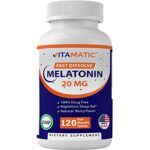Can I Take Melatonin With Trazodone For Sleep?

The collective term sleep disorder refers to conditions that affect sleep quality, timing, or duration and impact a person’s ability to properly function while they are awake. These disorders can contribute to other medical problems, and some may also be symptoms of underlying mental health issues.
Data indicates that more than one-third of adults in the United States report getting fewer than 7 hours of sleep in a 24-hour period. More than 70 percent of high school students report getting fewer than 8 hours of sleep on weeknights.
Most people occasionally experience sleeping problems due to stress, hectic schedules, and other outside influences. However, when these issues begin to occur on a regular basis and interfere with daily life, they may indicate a sleeping disorder.
Depending on the type of sleep disorder, people may have a difficult time falling asleep and may feel extremely tired throughout the day. The lack of sleep can have a negative impact on energy, mood, concentration, and overall health.
What are sleeping pills?
Sleeping pills also known as hypnotics, sedatives, sleep aids, sleep medicine, or tranquilizers are medications that help you catch some sleep. People who have sleep disorders like insomnia may take these medications to help them fall asleep. Sleeping medicines can also help you stay asleep if you’re prone to waking up in the middle of the night.
How do sleeping pills work?
There are various types of sleeping pills. Each works differently. Some sleep aids cause drowsiness, while others silence the area of the brain that keeps you alert.
What is melatonin?
Melatonin is a hormone that the pineal gland in the brain produces. People can also take it as a natural or synthetic supplement to promote restful sleep.
Melatonin fulfills many functions in the body, but it is mostly known for maintaining circadian rhythms. The circadian rhythm is the body’s internal clock. It tells the body when to sleep, and when to wake.
In humans, the circadian “clock” is in the suprachiasmatic nucleus (SCN) area of the brain. Using the daily pattern of light and dark, the SCN creates and maintains a regular sleep and wake cycle.
What is trazodone?
Trazodone is an antidepressant that belongs to a group of drugs called serotonin receptor antagonists and reuptake inhibitors (SARIs). While trazodone is not a true member of the selective serotonin reuptake inhibitors (SSRIs) class of antidepressants, it does still share many properties of the SSRIs.
Trazodone is used to treat major depressive disorder. It may help to improve your mood, appetite, and energy level as well as decrease anxiety and insomnia related to depression.
Trazodone works by helping to restore the balance of a certain natural chemical (serotonin) in the brain.
Can I take melatonin with trazodone for sleep?
No, avoid taking trazodone and melatonin together because doing so may increase the risk of side effects such as dizziness, drowsiness, confusion, and difficulty concentrating. Some people, especially the elderly, may also experience impairment in thinking, judgment, and motor coordination.
Although both melatonin and trazodone can improve sleep, studies indicate that melatonin promotes better sleep quality than trazodone after the first 4 weeks of use. Beyond melatonin, other types of sleeping pills may also interact with trazodone.
How to safely take sleeping pills
If your best attempts to get a good night’s sleep have failed, prescription sleeping pills may be an option. Here’s some advice on how to use them safely.
• Get a medical evaluation. Before you take sleeping pills, see your doctor for a thorough exam. Often, your doctor may be able to find specific causes for your insomnia. If you’re taking sleeping pills for more than few weeks, talk to your doctor about an appropriate follow-up schedule to discuss your medications.
• Read the medication guide. Read the medication guide for patients so that you understand how and when to take your medication and what the major potential side effects are. If you have any questions, ask your pharmacist or your doctor.
• Never take a sleeping pill until you’re going to bed. Sleeping pills can make you less aware of what you’re doing, increasing the risk of dangerous situations. Wait to take your sleeping pill until you’ve completed all of your evening activities, immediately before you plan on sleeping.
• Take your sleeping pill when you can get a full night’s sleep. Only take a sleeping pill when you know you can get a full night’s sleep of at least seven to eight hours. A few short-acting sleeping pills are intended for middle-of-the-night awakenings, so you may take them when you can stay in bed for at least four hours.
• Watch for side effects. If you feel sleepy or dizzy during the day or if you experience any other significant side effects, talk to your doctor about changing your dose or weaning off your pills. Don’t take a new sleeping pill the night before an important appointment or activity because you won’t know how it affects you.
• Avoid alcohol. Never mix alcohol and sleeping pills. Alcohol increases the sedative effects of the pills. Even a small amount of alcohol combined with sleeping pills can make you feel dizzy, confused or faint. Combining alcohol with certain sleeping pills can lead to dangerously slowed breathing or unresponsiveness. And alcohol can actually cause insomnia.
• Take sleeping pills strictly as prescribed by your doctor. Some prescription sleeping pills are for short-term use only. Be sure to contact your doctor for advice. Also, don’t take a higher dose than prescribed. If the initial dose doesn’t produce the intended effect on sleep, don’t take more pills without first talking to your doctor.
• Quit carefully. When you’re ready to stop taking sleeping pills, follow your doctor’s or pharmacist’s instructions or the directions on the label. Some medications must be stopped gradually. Also, be aware that you may have some short-term rebound insomnia for a few days after you stop taking sleeping pills.
If you continue to have trouble sleeping, ask your doctor for additional help.





